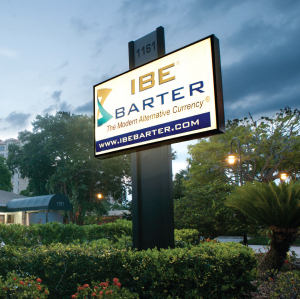
How A Private Currency Works
Now that a business owner joins a barter exchange, reciprocates referrals, and grows the business, how does Uncle Sam get his share of all that trading? It doesn’t matter how. It just matters that he gets it.
Barter exchanges know the inside outs of taxes. They have to. In 1982, the Internal Revenue Service (IRS) recognized the revenue passing between businesses through bartering, which prompted the creation of Tax Equity and Fiscal Responsibility Act (TEFRA). Barter exchanges complied. As third-party record keepers, they track sales, broker commission fees, and purchases, and provide monthly statements, similar to a bank. As such, they are required to report to the IRS the actual dollars earned for the year, per member, on a 1099B form. The IRS requires the exchange to report and send all of their members’ 1099B sales electronically.
 When joining an exchange, members receive a Form W -9 that requires a taxpayer identification number, such as social security. Members also receive Form 1099-B to report their barter income, which matches figures of the exchange’s 1099B. The form shows the value of cash, property, services, credits, or scrip.
When joining an exchange, members receive a Form W -9 that requires a taxpayer identification number, such as social security. Members also receive Form 1099-B to report their barter income, which matches figures of the exchange’s 1099B. The form shows the value of cash, property, services, credits, or scrip.
Just about any income, including barter, is taxable. “Whether you have to report it or not, doesn’t change the taxability of it,” says accountant, George Famiglio of Famiglio & Associates, and member of the International Barter Exchange (IBE) in Sarasota, FL. “Whether you do an independent contracting for a company and they pay you, and they forget to send you a 1099, that doesn’t change anything. It’s taxable no matter what.”
As members receive monthly statements from the barter exchange, they keep on top of their deductible expenses. “The goal is to have your expenses off-set your tax liability,” says Anne Unger Weiser, Director of New Membership Development with IBE. “If you deducted all your proper business expenses, you may come up with a zero balance to the IRS.”
According to the IRS, like other income, barter income, from an exchange or individual barter partners, can affect total income tax liability, self-employment tax, excise taxes, state taxes, and employment taxes. If members have completed transactions where the fair market value of the property is more than their cost, the transaction may be reported as business income or capital gains.
At tax filing time, Famiglio suggests the bartering business owner gather invoices, the 1099 B form, and all of their accounting work. Those barter exchange statements make it easy. At least, for Famiglio. “Smart clients are always on fiscal years,” he says.
Business expenses related to barter transactions may be deductible as legitimate business expenses. Deductions can include the initial fee of joining a barter exchange, and, the monthly administration fee, as well as office, vehicle and other operating costs.
Bartering also could result in non-deductible personal loss, capital losses, or ordinary business income. For example, a business owner trades five trucks for five new trucks. “There’s no gain because he’s not selling them out to a third party,” Famiglio says. “He’s giving them to a dealer for five new trucks. The tax advantage is, he doesn’t have to report any gain on the trucks.”
Complicated? Not so. “There’s nothing magical about it,” says Famiglio. “Whatever is going to be deducted anyway, it is going to be deductible by barter. So, if somebody pays me in barter credits and I get $500, that person can deduct $500 because they paid their CPA $500.” Or a florist barters $1000 for flooring, he deducts $1000. Bartering can apply to charity.
Paying tax on the value of goods or services wasn’t always tracked for societal benefit. Since the first Mesopotamia tribes traded their goods and services around 6000 BC, bartering expanded. A bartering system was adopted by Phoenicians, improved by Babylonians and used to pay Roman soldiers’ salaries with salt. In the middle Ages, Europeans traveled to barter furs and crafts. Colonial Americans traded ammunition, deer skins and crops. Though bartering maintained an alternative method of payment in rural areas, it gained popularity throughout the United States during the 1930s Great Depression.
Individuals continue trading, taking chances, trusting strangers. Businesses owners, who trade one-to-one, do so at great risk. The risk involves two parties who may not have a “coincidence of wants,” in which they both want what the other has. The items may not be of the same value, or, simply, one trader feels he didn’t get the quality that he traded away. Barter exchanges remove that risk, making the activity of doing trade, business.
Where there is business income, there are taxes. As a business owner adds bartering to his marketing plan, Famiglio suggests the owner include a certified public accountant that is tuned into barter. Bartering is “such a great way to expand your business,” he says. “When you can trade advertising, professional services, janitorial, office services– whatever. That’s smart to do.” It’s a smart way to expand, but it’s also smart to implement bartering within the operating costs of a business, especially, if that business has employees. For example, businesses that once provided a health care insurance plan for employees, and, no longer can afford it, find another way. Companies offer bartering to employees as compensation and bonuses, as long as those goods and services are reported on Form W-2, as they are subject to FICA, FUTA and federal income tax withholding.
“Once you join a barter system, you get a degree in economics automatically, because you understand what the economy is actually about,” says Famiglio. He encourages business owners to grasp a little knowledge of bartering and the tax industry, and find professionals who are unafraid. Simply, barter dollars work as actual dollars. “The uninformed accountant may say, ‘Oh, that’s barter. That’s weird stuff. I don’t want to learn about it’,” says Famigliio. Yet, bartering is not a tax tool; it’s a method of expanding one’s business. And, if that business owner understands the tax benefits, he may enjoy using a superior marketing tool and adding cash to his wallet.
Related
Latest from Facebook
IBE Barter Unlocking Opportunities
www.facebook.com/share/1CFoibiUYz/?mibextid=WC7FNe
... See MoreSee Less
- likes 1
- Shares: 0
- Comments: 0
0 CommentsComment on Facebook





